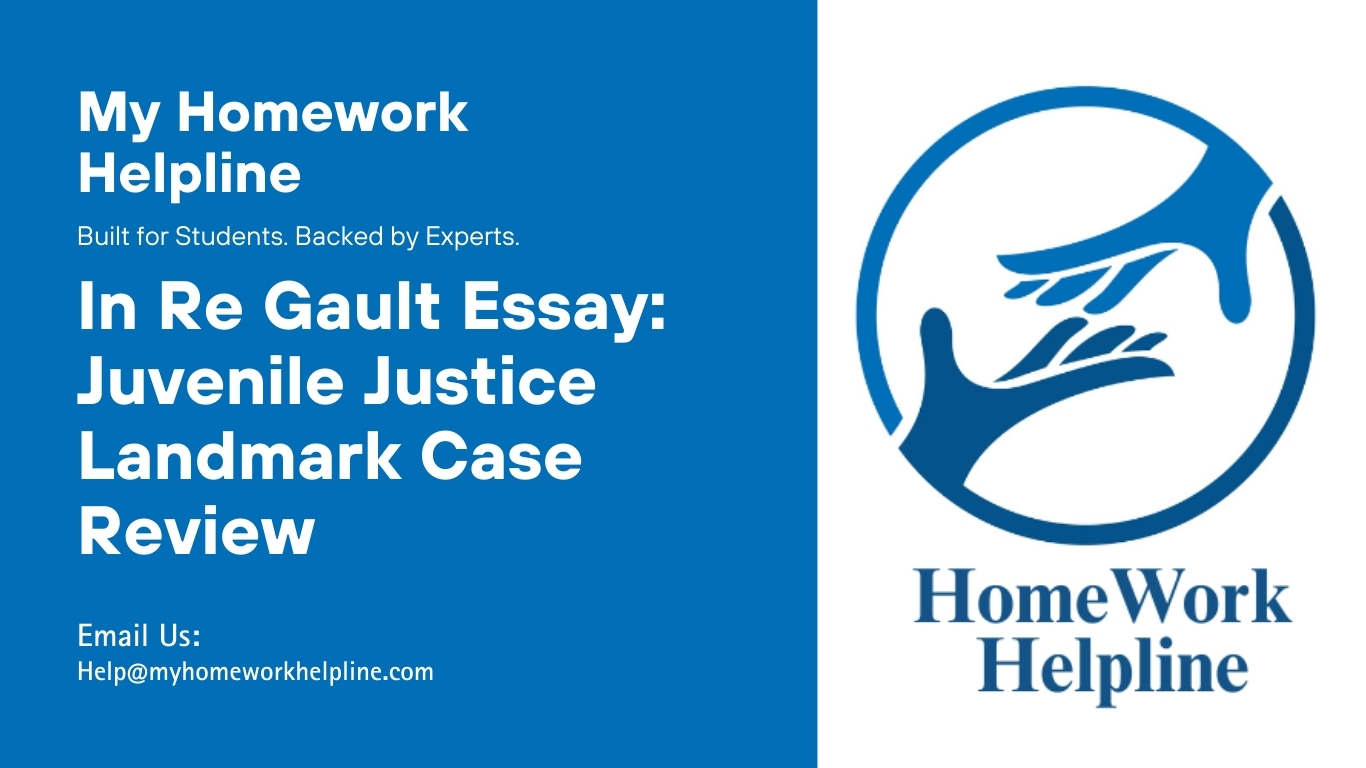In Re Gault Essay: Landmark Juvenile Justice Case Analysis
In Re Gault, 387 U.S. 1, 20 (1967) is the U.S. Supreme Court landmark case in the extension of juvenile justice rights (U.S Supreme Court, n.d.). According to National Juvenile Defender Center (2016) article, the case gave cases necessary due procedural rights, such as the opportunity to engage witnesses and access an attorney. The case appeal hearing was on December 6, 1966, and the judgment was on May 15, 1967. This paper intends to critically analyze In Re Gault case and its relevance to the judicial system today.
Need help completing your law assignments or essays on landmark cases like In Re Gault? Our Law Homework Helpline provides professional homework assistance and academic support for students. From legal briefs to research papers and detailed assignment guidance, our experts ensure your work meets the highest standards and deadlines. Get trusted essay help today and improve your grades with expertly crafted academic support.
The U.S Supreme Court (n.d.) states Gerald (“Jerry”) Gault, who was 15 at the time, was accused of calling Mrs. Cook through the phone in an insulting manner on June 8, 1964. Therefore, he was arrested, and his parents were at work. The arresting officer did not tell them about the imprisonment of their child. Gault’s mother instructed his elder brother to look for him. They finally received notification of Gault’s arrest from Ronald Lewis’ family. Mrs. Gault was informed she had a juvenile court hearing the next day at the Detention Home. The arresting officer submitted a petition to the Court the day before Gault’s first court appearance. Gault and his parents were not given notice of the petition. No script or record was prepared, and no one was sworn in before testimony. There are numerous versions detailing what Gault admitted when the judge interrogated him. Gault was returned to the Detention Home after the hearings. He stayed in detention for two or three days before being freed.
When Gault was freed, his parents learned about a June 15 hearing. Mrs. Cook was again absent from the June 15 session, despite Mrs. Gault’s plea that she be there. Again, there was no documentation of Gault’s admissions and incompatible versions. Probation officers charged indecent phone calls during this hearing. A grownup would have gotten a $50 penalty and two months of prison for the same offense. The judge sentenced Gault to six years in juvenile jail until he was 21. The Arizona Superior Court and Supreme Court denied Gault’s parents’ habeas corpus petition. The Gaults then petitioned the Supreme Court. The Court agreed to consider a case about a juvenile’s due process rights.
A Superior Court of Arizona judge appointed as a juvenile court judge handled Gault’s case. Gault was sent to juvenile jail until he was 21. At the time, Arizona law did not allow appeals in juvenile cases; thus, a habeas petition was filed and forwarded to the Superior Court. The Arizona Supreme Court upheld the Superior Court’s decision. The Supreme Court decided to consider the case to establish a minor accused’s procedural rights in criminal hearings with detention.
Ruling
The Court emphasized the significance of due process, implying that it is the foremost and essential basis of personal rights and that the proceedings shaped from the generalization of due process are the most significant instruments for distilling and evaluating important details from clashing. If Gault had been 18 when arrested, he would have had adult procedural protections. The Justice examined the juvenile legal process and determined that, even though there are legitimate reasons to handle adults and juveniles distinctively, children who have committed crimes and imprisonment are subjected to certain legal protections under the Fourteenth Amendment’s Due Process Clause (U.S Supreme Court, n.d.) Since the Court unanimously rejected Betts v. Brady, the Arizona Supreme Court’s verdict was overturned, and the case was restored.
Conclusion
Re Gault is substantial in juvenile Justice because it eliminated the inequities that juveniles had been subjected to. It gave children crucial due process rights like the right to confront witnesses and the right to an attorney (National Juvenile Defender Center, 2016). Magistrates or probation officers could no longer disregard good intent for procedural safeguards. Without full disclosure of the facts, a child may no longer face the excellent possibility of incarceration. Furthermore, young people could no longer be subjected to legal proceedings without the rights and protections provided by the Due Process Clause just by their age.
References
National Juvenile Defender Center. (2016). In re gault 387 U.S. 1 (1967). NJDC. Retrieved August 24, 2022, from https://njdc.info/wp-content/uploads/2016/10/NJDC-Pocket-Gault.pdf
U.S Supreme Court. (n.d.). In re Gault, 387 U.S. 1 (1967). JUSTIA. Retrieved August 24, 2022, from https://supreme.justia.com/cases/federal/us/387/1/

